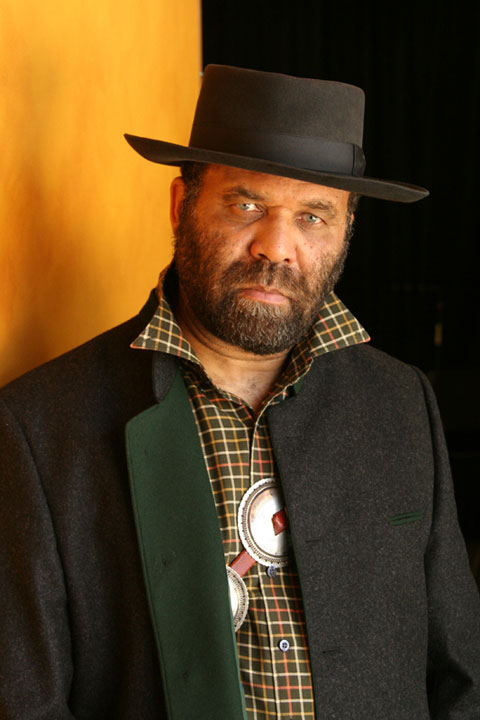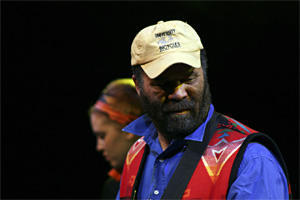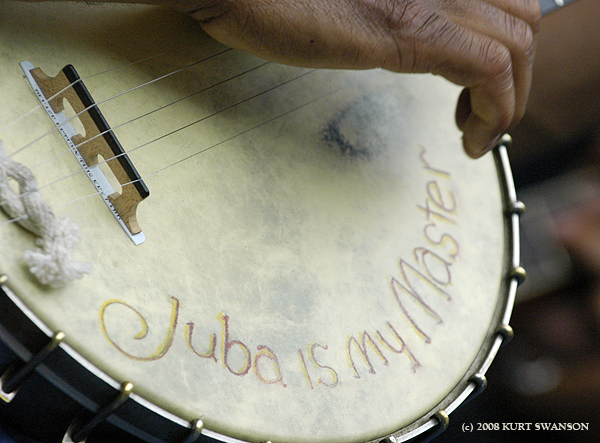OTIS TAYLOR / “Absinthe”

I want people to know that the banjo came from Africa—that it’s an African instrument. Recapturing the Banjo is an educational album, not just good music. A lot of people think the banjo was developed for bluegrass or Appalachian folk music, but banjo-like instruments discovered on archeological digs in North Africa have been dated back at least 700 years. I want to recapture the banjo’s identity as a black instrument. It didn’t get here until the slaves did.I’m going to keep this short for now. I'll be longer, or at least longish, next week when I kind of ramble through the recorded work of Otis Taylor.
—Otis Taylor

So this is a banjo-oriented album made up of new and old songs and featuring five of the finest of the fine crop of youngish blues masters (Guy Davis, Corey Harris, Alvin Youngblood Hart, Keb’ Mo’ and Don Vappie). Collectively they join the sexagenarian and session leader Otis Taylor who called them together for Taylor's recent outing.
This some mixed-up time traveling music. These cats could have been from a bygone era except the outlook is decidedly post-modern. I mean the songs are often an oblique look at the social context of American history. But rather than give lectures, what my man Otis Taylor does is snatch small but deeply emotional slivers of the history. Otis then commences to throwing those shards of haunted experiences upside the walls of our consciousness.
His music troubles you. Makes one a little uncomfortable, like them awful side-of-the-road accidents we see fleetingly as we hurry on down the expressway. Car be burned-out metal carcass, all smashed up, a big truck done run all up back, across and over it. Might even be some blood on the asphalt, for sure a lot of broken glass, blue lights flashing, and some paramedics putting a body bag into the back of an ambulance turned hearse. This is the kind of blues that will give you the blues for truth.
Half the time you won’t so much know what he be talking about but you be feeling like he talking about something deep. And often with a haunting female voice shadowing his gruffness.

That’s his daughter Cassie Taylor both singing as well as playing the bass. She be like the woman at the back of the crowd what done fell to her knees moaning at the flaming sight of her used-to-be strong black man swinging in the sundown breeze, what’s left of him hanging from one of them sickly smelling magnolia trees. Or something dangerous like that.
This is one hell of an album, especially in that Otis gathers together a bunch of folk who have their own albums and then six supreme chefs proceed to conjure up one super-size crock pot of crucial aural gumbo.
So look for more next week. Not more banjos but more post-modern blues that references the real of our history, the parts that they don’t regularly teach in public (nor private or parochial) school. Plus, we’ll consider the off-kilter approach Taylor takes to music making, an approach that is old as our souls.
More in a minute, meanwhile chew on what we got here.
—Kalamu ya Salaam
Otis Taylor Playlist

All of these tangy cuts are from Recapturing The Banjo.
01 “A Prophet’s Mission”
This one features composer Alvin Youngblood Hart on lead vocals singing about Tecumesh, a Native American chief who “traveled from Ohio to Florida preaching to all Indian tribes that they should unite and fight against white men who were polluting the land.”
02 “Absinthe”
That’s Ron Miles on cornet and Kevin Moore Jr. on drums joining the banjo and bass choir. Otis wrote this one about “a man drinks too much absinthe and goes crazy.”
03. “Live Your Life”
This is an Otis Taylor composition featuring lead vocals by Keb’ Mo’. The message is in the title.
04 “Walk Right In”
Features lead vocals by Corey Harris on this standard which was written by Gus Cannon, African-American banjo player (1883-1979). I believe that’s Guy Davis doing the extra verse after Corey. Although the liner notes don’t say so, I’, pretty sure the banjo solo is by New Orleans’ own, brother Don Vappie.
05 “Simple Mind”
That’s Otis’ voice on his composition, which he describes thusly, “A well-loved, uncomplicated young Black woman disappears after playing in a field. The white sheriff refuses to investigate her disappearance.”
06 “The Way It Goes”
Keb’ Mo’ closes out the musical "conversating" by offering up some folk wisdom he wrote. It’s a true conversation, just two men, Keb’ Mo’ and Otis sitting out on the veranda observing the ways of the world.
Enjoy.
This entry was posted on Monday, July 13th, 2009 at 1:45 am and is filed under Contemporary. You can follow any responses to this entry through the RSS 2.0 feed. You can leave a response, or trackback from your own site.
Leave a Reply
| top |